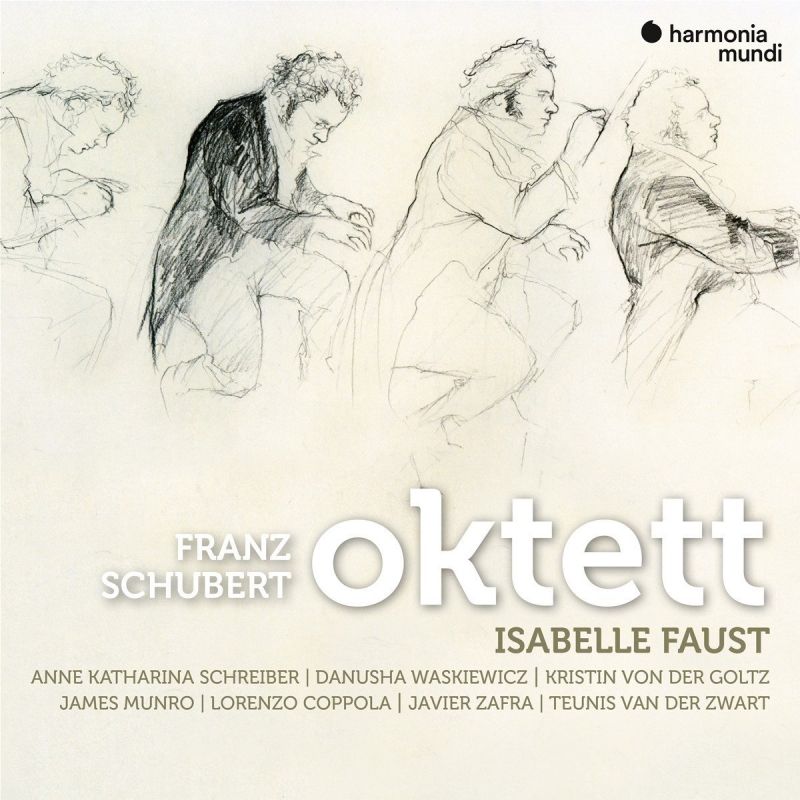SCHUBERT Octet (Faust et al)
View record and artist detailsRecord and Artist Details
Composer or Director: Franz Schubert
Genre:
Chamber
Label: Harmonia Mundi
Magazine Review Date: 07/2018
Media Format: CD or Download
Media Runtime: 70
Mastering:
DDD
Catalogue Number: HMM90 2263

Tracks:
| Composition | Artist Credit |
|---|---|
| Octet |
Franz Schubert, Composer
Anne Katharina Schreiber, Violin Danusha Waskiewicz, Viola Franz Schubert, Composer Isabelle Faust, Violin James Munro, Double bass Javier Zafra, Bassoon Kristin von der Goltz, Cello Lorenzo Coppola, Clarinet Teunis Van der Zwart, Horn |
| (5) Minuets and Trios, Movement: D minor |
Franz Schubert, Composer
Anne Katharina Schreiber, Violin Danusha Waskiewicz, Viola Franz Schubert, Composer Isabelle Faust, Violin James Munro, Double bass Javier Zafra, Bassoon Kristin von der Goltz, Cello Lorenzo Coppola, Clarinet Teunis Van der Zwart, Horn |
| (5) Minuets and Trios, Movement: No 5 |
Franz Schubert, Composer
Anne Katharina Schreiber, Violin Danusha Waskiewicz, Viola Franz Schubert, Composer Isabelle Faust, Violin James Munro, Double bass Javier Zafra, Bassoon Kristin von der Goltz, Cello Lorenzo Coppola, Clarinet Teunis Van der Zwart, Horn |
Author: Richard Wigmore
While alive to the Octet’s Viennese hedonism, Faust and her colleagues are unusually responsive to its mysterious shadows, not least in the Andante and the Minuet, poised here between dance and dream. The period instruments, superlatively played (with minimal string vibrato), create naturally softer, more transparent textures than their modern counterparts. They make you uncommonly aware how much of Schubert’s score is marked pianissimo: say, in the first movement’s yearning second theme, sounded in turn by clarinet and horn, with characteristic touches of flexibility; in the rarefied duetting of the Adagio, its phrases floated over the bar line; in the clarinet’s diminuendo from piano to pianissimo in its solo near the start of the Scherzo, an effect glossed over in most performances; or in the magical horn solos near the close of the first movement and Minuet, sounding as if from the depths of the Romantic forest. Equally magical (a word that cropped up repeatedly in my listening notes) is the fourth movement’s penultimate variation, where the once homely theme dissolves into a hushed – and here, otherworldly – reverie.
After the eerie shudders of the slow introduction (which here sounds genuinely disturbed rather than mock-theatrical Grand Guignol), the Octet’s finale can often seem an anticlimax. Not here. Paying close attention to Schubert’s pp markings, the players make it airy and buoyant rather than hearty. As ever, the lighter period double bass ensures that textures are never weighed down, while the bouts of violin and clarinet virtuosity emerge as effortlessly joyous rather than merely frenetic. Impossible, of course, to talk of an outright winner among dozens of versions of this much-loved work. My own favourites include the Vienna Octet, 1990 vintage (Decca, 2/93), the Nash Ensemble (Virgin/Erato, 4/89, 10/94) and the more leisurely Mullova Octet (Onyx, 2/06). But the new performance’s transparency and intimacy, its fine balance of exuberance and poetic inwardness, make it an immediate front-runner. There is a delightful bonus, too: arrangements of two early Schubert minuets that infuse Mozartian elegance with the demotic spirit of the Viennese beer garden, duly relished here.
Discover the world's largest classical music catalogue with Presto Music.

Gramophone Digital Club
- Digital Edition
- Digital Archive
- Reviews Database
- Full website access
From £8.75 / month
Subscribe
Gramophone Full Club
- Print Edition
- Digital Edition
- Digital Archive
- Reviews Database
- Full website access
From £11.00 / month
Subscribe
If you are a library, university or other organisation that would be interested in an institutional subscription to Gramophone please click here for further information.




